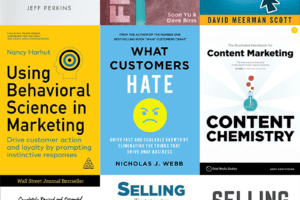Episode 70 of Yes, and Marketing
Product marketing is likely the most critical skill set for modern companies today, and it’s also one of the least understood.
Crispin Read, one of the world’s leading product marketers, joins Steve on this episode to talk about what he does and how he defines it after a career that has spanned software engineering, product management at companies like Business Objects and Microsoft, and product marketing consulting to tech companies worldwide. Consider this a crash course in product marketing:
- Crispin’s controversial take on how product marketing relates to product management
- How to hire a product marketer
- The single most important quality a product marketer should have (and it’s *not* a technical background)
- The difference between hot and cold markets
- An example of second product syndrome
- Why he started Product Marketing Hive, a free community of product marketers
Listen and tap through the chapters above or read on for our summary of the conversation. You can also watch the full interview on our podcast page.
Guest-at-a-Glance
???? Name: Crispin Read
???? What he does: Founder of Product Marketing Hive. CEO of Product Marketing Edge, an invitation-only product marketing enablement service.
????️ Find Crispin on the web: Product Marketing Hive | LinkedIn
???? Get smart: “If your product’s not different, your company really doesn’t need to exist.”
Top Takeaways
Product marketers: Know your customers ????
There’s a popular misconception that product marketers need to have a technical background. Unless you are selling your product to developers, Crispin says, that’s not the case.
The experience and expertise you should have instead? Your customers’ industry. You need to be able to identify with your customers and understand their responsibilities, their pain points, the topics they’re thinking about and how they spend their working hours, so you can recognize their needs and how your product can meet them.
Measure different businesses separately ????
If your business has a multi-product portfolio, don’t fall into the trap of aggregating their data and losing all the relevant information in the process.
Crispin recounts a monthly business review meeting for a division at Microsoft. The average sales price had gone up, which led to a lengthy disagreement about whether that was a good or bad thing. The cause of the confusion? The division sold products to very disparate customers in very different ways. For some of those businesses, it operated on volume and a rising ASP was bad. For others, a rising ASP was good.
By not recognizing those businesses as being on separate playing fields, metrics lost their meaning.
What to do instead? “You measure the playing fields independently,” Crispin explains. “If you just add everything up, then you’ve compressed the information to a point where a lot of the key information has been lost.”
“You don’t know what’s happening,” he adds. “It could be good. It could be bad.”
Episode Highlights
Crispin’s definition of product marketing
“Product marketing is the subset of product management that is about the commercial success of the product, whereas there’s other aspects of product management that are more about building the product. It’s really about, how can you make a product successful? Which could include strategy, it could include influencing the roadmap, it does include positioning and messaging for the products, it includes sales enablement—all of that fits into it. But it’s really about commercial success.”
The startup wheel of life
“There’s this cycle where small companies grow, they become big, they get bought by giants—or become giants, but most often get bought by giants—and disappear. And then another wave pops up and they do the same thing and it just goes round and round in circles.”
Product marketing experience vs. industry expertise
“A lot of people in product marketing leadership roles wonder, where should I get my next product marketer? And often the trade-off is between, should I hire someone who knows product marketing or should I hire someone who knows my business? Or should I try and find both, where the Venn diagram between those two things may be tiny?
If you already have the beginnings of a functioning product marketing organization in place, it’s often better to go out and buy someone who’s an expert in the business, bring them in and then train them on product marketing. Because it might be easier to teach someone product marketing than to teach someone financial management, for example, if that’s what you do.”
Technical background not required
“There is an idea that is widely held, which I think is largely a misconception: that in order to be good at product marketing or even product management, frankly, you have to have some kind of a technical background.
And in fact, it’s absolute nonsense because what you need to be good at product marketing—and I think product management too, to a large extent, but especially product marketing—is you need to be able to identify with the customer of the product.”
Self-defined and self-directed
“Product marketing teams do have very different responsibilities, but they are largely self-defined. So I think that the onus is on the product marketer to develop the skills to do the things that they think are important for the company.”
Have more ideas before you build
“If thinking about something costs one—you know, it could be $1, it could be a million dollars, a hundred thousand dollars, whatever. If thinking about something costs one, building it costs maybe 10, right? It costs about 10 times more to build it, but selling it costs about a hundred. So the worst thing you can possibly do is to spend your money on having an idea, building it, and selling it because you just spent 111, whereas you could’ve thought about three ideas and it would have cost you three.”
How to approach a hot market ????
“In a hot market, which is a very established market, the people that are buying are super educated and they always know more about this product than your marketing department.
…Let’s use CRM as an example. If somebody is buying CRM software today, who are they? They’re gonna be someone who’s been in the CRM space, probably in sales operations, for years, right? They’ve implemented three or four CRM systems, Salesforce, and maybe a couple of others. They know everything about the space. They know how to implement Salesforce. And then your marketing department says to them, ‘Let me explain to you the business value of CRMs’…?
I don’t think so. I don’t think that’s what they want to know. They could explain to you if they had time or if they were interested in what the business value of CRM was, but that’s not really their job. They’re evaluating. They want to go buy something. If you want to say anything to them, it has to be, why should I spend more than another 10 seconds on your website? What’s the huge difference that justifies the existence of your company?”
What to do in a cold market ❄️
“Find a vertical use case. And then if that works for a couple of people, if you think it’s repeatable, then you could go anywhere from repositioning your entire company into that—which most people are reluctant to do and probably more reluctant than they should be to do—or you could at least certainly productize it.”
Products are intellectual constructs
“You can materialize a product, right? You don’t have to solution sell, ‘I’ve got a platform, but it can solve your prob-‘ — You can just change it. Products are things that you create and destroy all the time. They’re just intellectual constructs. It’s just a boundary you draw and intellectual properties that create and instantiate a product for those people. You know, ‘We have the solution for publishing,’ whatever publishing solution, then just going to sell it. And then you can instantiate another one if you find another use case.”
What’s a battle card?
“Competitive intelligence teams have been around for years producing [battle cards.] They used to be sort of laminated pieces of paper, just simply a one pager on the competition. …And it’s going to have things on it like key strengths, strengths of the competitor, weaknesses of the competitor, why we win, why we lose, landmines that you could leave, objection handling, and they’re very useful because they’re capture in a small amount of space, very frequently repeating situations.
What happens is, if you’re in a business and you have those competitors you keep coming up against, you’ll often find they keep leaving these landmines for you to step over. So that’s objection handling.
…What I like about doing that sort of work is that it allows you to cut through the lies or exaggerations that competitors are making and helps you help customers to find the truth.”
Top Quotes
????️ Crispin:
“It’s very hard to say anything sensible about a company that does so many different things.”
“One way to find out if someone would be good at doing a job is just to ask them to do it.”
”If you enter a hot market, the number one thing that you need to communicate to people is why they should buy your product.”
“If your product’s not different, your company really doesn’t need to exist.”
“It didn’t matter how much better you were than the competition. If there’s no active buyers, then no one cares.”
“You can take a lot of smart people and you can render them stupid in a multi-product portfolio by not thinking about it in the right way.”
“You should think about more than one thing before you consider that you have a business that should be funded and grown around.”
Learn More
Read more about Product Marketing Hive.



